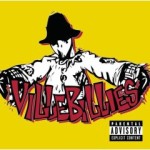social bookmarking tools:
 |
|
| Available RSS Feeds |
|---|
 - Top Picks - Top Picks |
 - Today's Music - Today's Music |
 - Editor's Blog - Editor's Blog
|
 - Articles - Articles
|
Add Louisville Music News' RSS Feed to Your Yahoo!
|
Rap For Home
Villebillies (Universal Motown)
Villebillies
By Tim Roberts
Several years ago, I shared my copy of The Seduction of Claude Debussy by the Art of Noise with a co-worker of mine. Several critics thought that particular work was pretentious, bombastic, confusing, wasteful of recording equipment and peoples' time (in making it and listening to it). I was in the minority who actually liked it. I thought it was heady, surreal, haunting, made for the times when you just want to slip on the headphones and disappear from the world just for a few minutes. And, yeah, sometimes pretentiousness works.
The next day she came into my office thrust it back to me. I asked how she liked it. And in a voice that could give a paper cut, she said, "I don't like rap."
I was puzzled. It wasn't a rap CD, I explained. Sure, one track did feature the rapper Rakim in a segment that mentioned the poet Charles Beaudelaire, but that was it.
"Well, I still don't like rap," she said and then left.
So what does this have to do with the latest release by the Villebillies?
To be sure, rap has a self-perpetuating image problem. Intertwined with hip-hop, it is associated with the decried pimp-and-thug culture, with bling-laden, baggy-pantsed youths dropping f-bombs every other word and leggy young women in boy shorts and push-up bras who apparently have them on speed dial for booty calls. No wonder suburban parents bristle when they hear their children are learning the alphabet as a rap and they come home reciting it like lil' gangstas.
But sometimes it is done a bit differently. Especially by a band like the Villebillies.
Hailing from Louisville, the Villebillies don't rely exclusively on the raps they do in their songs. For them, just like De La Soul or P.M. Dawn, Beck, Louisville's Big Diggity and even Ani DiFranco, rap is only one element of a song and not the entire work itself. And there's plenty of that with their second, eponymous release on Universal Motown.
They combine lots of traditional instrumentation in their songs, acoustic guitar, mandolin, banjo, which keeps it rooted in the traditions of the state from which they come and to which they pay tribute in "Grass Roots," where they long for the place where they can have conversations with real people, of family members who miss them, of cheap cigarettes, of getting away from women who are so uptight that they lift their hemlines each time they raise their eyebrows. They also speak of fighting alcohol addictions in "Mr. Brown Bag," which lays down a rap over a smooth rhythm-and-blues vibe time-warped in from 1971.
There's also a tribute to their home state in "Old Faithful," mixing banjo-pickin' and hand-clappin' with a rap that celebrates all that the Bluegrass has given to culture and "Rollin' Stone," a tune that should be on the playlists of acts like Brooks & Dunn.
Still, the recording finishes up with some harder-core raps and scorching rhythm-and-blues, with some acid metal that includes a taste of banjo, so dedicated rap fans should not be disappointed.
Throughout the work, there's a clear sense that the Villebillies are grateful for having a home like Louisville. Even though they have a name on both coasts, it's clear where their hearts are. That gives their work a different, less-threatening image and it proves that rap doesn't always come from Los Angeles or New York City. It also comes from places named Bowling Green, Campbellsville, Hazard, Morehead, Paducah. And it doesn't always have to come from Compton, Watts, Brooklyn, Cabrini Green or Jersey City to be real. It can also come from Shively, Portland, Hikes Point, Pleasure Ridge Park, the Highlands, Buechel.
It comes from anywhere people call home.
Come home and visit www.villebillies.com.

